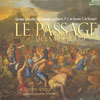(Le) Passage de la Mer Rouge
A new ensemble makes its debut on disc with a selection of French cantatas
View record and artist detailsRecord and Artist Details
Composer or Director: Elisabeth-Claude Jacquet de la Guerre, Sébastien de Brossard, René Drouard de Bousset
Genre:
Vocal
Label: K617
Magazine Review Date: 8/2010
Media Format: CD or Download
Media Runtime: 52
Mastering:
Stereo
DDD
Catalogue Number: K617218

Tracks:
| Composition | Artist Credit |
|---|---|
| Cantatas françoises sur des sujets tirés de l', Movement: Le passage de la mer rouge |
Elisabeth-Claude Jacquet de la Guerre, Composer
(Le) Tendre Amour Elisabeth-Claude Jacquet de la Guerre, Composer Luanda Siqueira, Soprano |
| Judith |
René Drouard de Bousset, Composer
(Le) Tendre Amour Luanda Siqueira, Soprano René Drouard de Bousset, Composer |
| (La) cheute de Salomon |
Sébastien de Brossard, Composer
(Le) Tendre Amour Luanda Siqueira, Soprano Sébastien de Brossard, Composer |
Author: Richard Lawrence
Elisabeth Jacquet de la Guerre was the most distinguished of a line of musicians and instrument-makers. Though known today primarily as a composer of harpsichord pieces, she published books of sacred cantatas in 1708 and 1711. They were scored for voice and continuo, with or without instruments: Le Tendre Amour offer violin, flute and oboe, together or separately, throughout the disc. The writing in The Crossing of the Red Sea is an effective mixture of da capo aria and French declamation, the opening recitative including a bass-line that vividly illustrates the Israelites’ fears. The Fall of Solomon by Sébastien de Brossard contrasts the king’s wisdom with his weakness for the distractions of love. It includes an air gayement in rondo form – the third stanza is missing from the booklet – with the theorbo of Sofie Vanden Eynde providing a haunting postlude. René Drouard de Bousset’s Judith, publishedin 1735, is firmly in the Italian format ofthree recitatives and arias: the last aria celebrates Judith’s murder of Holofernes, violin and oboe convincingly representingthe “bruyante trompette”.
Le Tendre Amour and Luanda Siqueira, a Brazilian singing with 18th-century pronunciation, perform these little-known pieces with passion and vitality. The booklet-notes are translated but not the texts.
Discover the world's largest classical music catalogue with Presto Music.

Gramophone Digital Club
- Digital Edition
- Digital Archive
- Reviews Database
- Full website access
From £8.75 / month
Subscribe
Gramophone Full Club
- Print Edition
- Digital Edition
- Digital Archive
- Reviews Database
- Full website access
From £11.00 / month
Subscribe
If you are a library, university or other organisation that would be interested in an institutional subscription to Gramophone please click here for further information.




